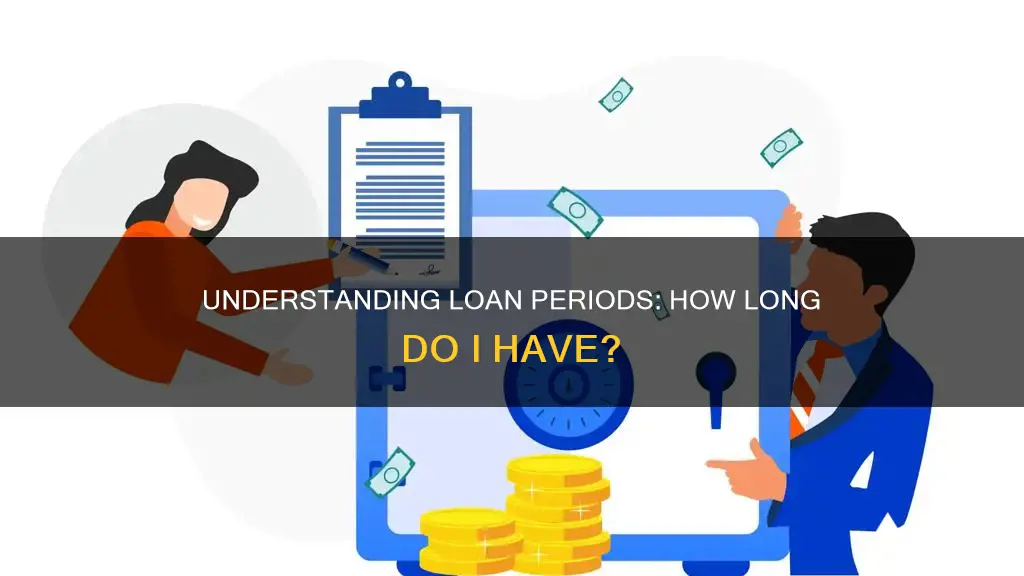
The loan period is the amount of time a borrower has to repay their loan. It is determined by several factors, including the minimum and maximum payment, interest rate, and principal amount. The loan period can vary depending on the type of loan, state laws, and the borrower's credit history. It is an important consideration when deciding whether to borrow from a lender, as a longer loan period results in more interest paid overall, while a shorter loan period leads to higher monthly fees.
| Characteristics | Values |
|---|---|
| Definition | The repayment length of a loan |
| Factors | Minimum and maximum payment, interest rate, principal amount, type of loan, state laws, credit history |
| Interest | Longer loan periods result in more interest but lower monthly payments |
| Credit Score | Paying off a loan quickly generally improves your credit score |
| Interest Rate | Fixed or variable interest rates impact the cost of borrowing funds |
| Balloon Payments | Some loans require a large payment at the end of the loan period |
| Minimum Monthly Amount Due | Lenders may have caps on the amount paid each month |
| Early Payment | Some lenders impose penalties for early payment |
| Flexibility | Lenders may offer flexibility with early payments, late fees, or loan period adjustments |
What You'll Learn

The loan period is the repayment length of a loan
Loan periods can vary significantly, and it is essential to consider the advantages and disadvantages of a longer or shorter loan period before agreeing to the repayment terms. A longer loan period results in lower monthly payments but higher overall interest. On the other hand, a shorter loan period leads to higher monthly fees but lower total interest costs.
The interest rate is a crucial factor in determining the cost of borrowing. It is important to understand the interest amount in both monthly and annual terms and whether the interest is fixed or variable. Some loans may also have balloon payments, where a large payment is due at the end of the loan period. Lenders may also impose early payment penalties, so borrowers should be aware of any fees associated with early repayment.
The principal amount, which is the amount borrowed without any fees or interest, is another factor influencing the loan period. Knowing the exact amount borrowed and the difference in what needs to be repaid can help borrowers determine the most suitable loan period for their financial situation. A good credit score generally leads to better interest rates and terms, so borrowers may want to consider their credit score before applying for a loan.
Bluewave Loans: A Comprehensive Overview
You may want to see also

The loan period is determined by the minimum and maximum payment, interest rate, and principal amount
The loan period is the length of time a borrower has to repay a loan. This period can be short, such as 15 years, or long, such as 30 years or more. The loan period is a crucial factor in determining the total cost of a loan, as it directly impacts the interest rate and payment schedule.
The interest rate is the cost of borrowing the principal loan amount, expressed as a percentage. The interest rate is influenced by the loan period, with shorter-term loans typically offering lower interest rates. This is because a shorter repayment period reduces the lender's risk. For example, a 15-year loan might offer a 3.5% interest rate, while a 30-year loan might offer a 4% rate. As a result, borrowers with shorter-term loans pay less interest over time.
The minimum and maximum payments are also influenced by the loan period. With a shorter loan period, the borrower must make larger monthly payments, which can be challenging for those with limited cash flow. However, making only the minimum monthly payments on a long-term loan will result in higher interest expenses and a longer repayment period. Therefore, it is generally recommended to pay credit card balances in full and on time to avoid interest and late fees.
The principal amount, or the sum borrowed, also impacts the loan period. Non-revolving credit accounts, for example, provide a one-time lump sum payout with a specified repayment period. The borrower must adhere to a fixed payment schedule until the loan is fully repaid.
In summary, the loan period is determined by the interplay between the minimum and maximum payments, interest rate, and principal amount. Understanding these factors is essential for borrowers to make informed decisions about their loans and to potentially save money over the life of the loan.
China's Debt: America's Multi-Million Dollar Question
You may want to see also

The longer the loan period, the more interest accrued
The loan period is the repayment length of a loan. In other words, it is the amount of time a borrower has to repay their loan. This period is determined by considering the minimum and maximum payments, the interest rate, and the principal amount. The loan period starts when the borrower begins to repay the loan and ends when the borrower finishes repaying it.
Loan periods can vary depending on several factors, such as the type of loan, state laws, and the borrower's credit history. For instance, personal loans and credit cards typically have shorter loan periods ranging from a few months to a few years. In contrast, other types of loans, such as mortgages, may have much longer loan periods that can span several decades.
When considering a loan, it is essential to understand the relationship between the loan period and the interest accrued. A longer loan period results in more interest being accrued over time. This is because the interest rate is typically applied to the outstanding balance of the loan, and with a longer loan period, the balance takes longer to pay off, resulting in more interest charges.
On the other hand, a shorter loan period means that the borrower will pay less interest overall. However, it is important to note that shorter loan periods often come with higher monthly payments, which can be a significant financial burden for some individuals. Therefore, borrowers must carefully consider their financial situation and ability to make regular payments when deciding on the loan period that best suits their needs.
Additionally, it is worth noting that the interest rate itself can be either fixed or variable. A fixed interest rate remains the same throughout the entire loan period, while a variable interest rate may change over time, depending on market conditions or other factors. Understanding whether the interest rate is fixed or variable is crucial for borrowers to anticipate and plan for their future payments effectively.
Unusual Examples: Identifying Outliers in Common Lists
You may want to see also

The impact of the loan period on your credit score
The loan period is the amount of time a borrower has to repay their loan. It is determined by the minimum and maximum payment, interest rate, and principal amount. The loan period can vary depending on the type of loan, state laws, and the borrower's credit history.
Now, let's discuss the impact of the loan period on your credit score:
A longer loan period means you will pay more interest over time, but it can result in lower monthly payments. While this may make it easier to manage your monthly budget, the overall cost of the loan will be higher. On the other hand, a shorter loan period will lead to lower total interest paid, but the monthly payments can be significantly higher. It's important to consider your financial situation and decide which option works best for you.
The loan period can also influence your credit score. Generally, paying off a loan quickly is considered positive for your credit score. However, this may not always be the best option for everyone, as it could result in higher monthly payments. You need to weigh the potential positive impact on your credit score against the amount of money that will be coming out of your budget each month.
Additionally, the interest rate on the loan is a crucial factor. A higher interest rate will increase the overall cost of borrowing. Make sure you understand the interest amount in both monthly and annual terms. Also, ask your lender about fixed or variable interest rates. Some loans may have a balloon payment, which is a large payment due at the end of the loan period. It's important to be aware of this to avoid surprises.
Your credit score is calculated based on several factors, including payment history, amounts owed, length of credit history, new credit, and credit mix. Taking out a personal loan can impact your credit score positively or negatively. While it may not be inherently bad for your credit score, it can affect your overall score in the short term and make it harder to obtain additional credit until the loan is repaid. However, repaying a loan on time can boost your score and help build your creditworthiness over time.
In conclusion, the loan period can have a significant impact on your financial situation and credit score. It's important to carefully consider the loan terms, including the loan period and interest rate, to make an informed decision that aligns with your financial goals and budget.
Stafford Loans: Impact on SNAP Benefits Eligibility
You may want to see also

Flexibility of lenders with early payments
The loan period is the amount of time a borrower has to repay their loan. It is determined by various factors, including the minimum and maximum payments, interest rate, and principal amount. The type of loan, state laws, and credit history can also influence the loan period.
When it comes to early payments, not all lenders are created equal. Some lenders may charge penalties for early repayment, especially in subprime lending due to the higher risk associated with the borrower. These penalties are implemented to secure the lender's interest income from month to month. However, there are lenders who offer flexibility with early payments.
It's important to understand the impact of early payments on your loan. Making early payments can positively affect your credit score, indicating your ability to manage debt effectively. Additionally, it can reduce the total interest paid over the loan period. Lenders who are flexible with early payments may not impose penalties, allowing you to save on interest costs.
When considering early repayment, it's crucial to review the terms of your loan agreement. Some lenders may have specific conditions or restrictions regarding early payments. Understanding these terms can help you make informed decisions and avoid any unexpected fees or charges.
Ultimately, the flexibility of lenders with early payments can vary. While some lenders may charge penalties, others may offer adjustments to your loan period or suggest alternative loan products that better suit your changing financial situation. It is beneficial to discuss your options with your lender and understand their policies to make the most of your early payment capabilities.
Mr. Cooper: Exploring Equity Loan Options and Possibilities
You may want to see also
Frequently asked questions
The loan period is the amount of time a borrower has to repay their loan.
The loan period is determined by considering the minimum and maximum payment, interest rate, and principal amount.
Loan periods can vary significantly depending on the type of loan. For example, personal loans and credit cards typically have shorter loan periods ranging from a few months to a few years.
Yes, lenders usually offer flexibility in loan periods. They may extend the loan period to lower monthly payments or offer alternative loan products that better suit the borrower's needs.
Repaying a loan quickly generally has a positive impact on your credit score. However, this may come at the cost of higher monthly payments, depending on the loan terms.







